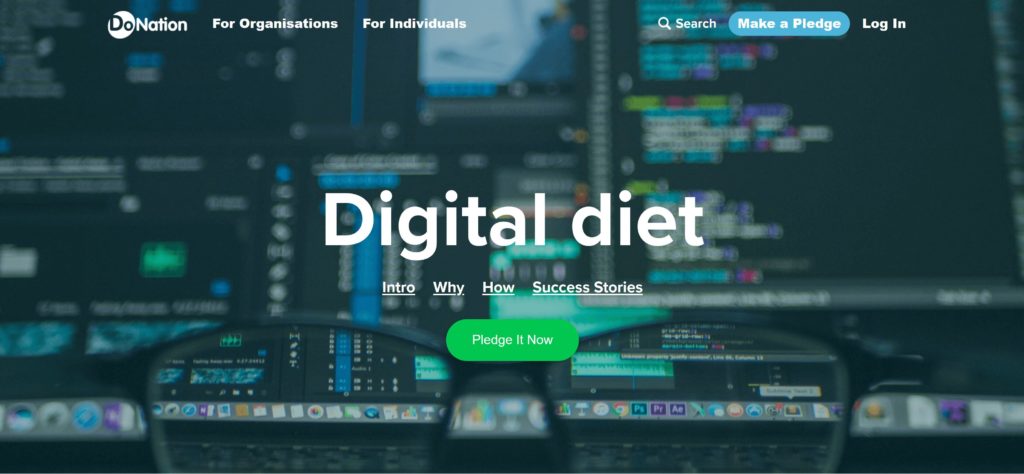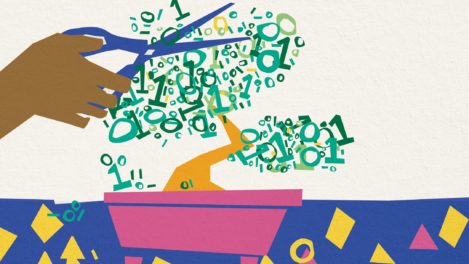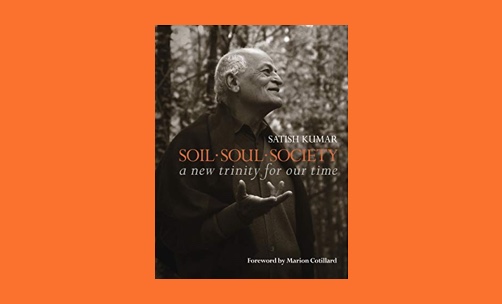|
Cutting down on the carbon calories
|
In our industry, it’s easy to be on devices all day – listening to a podcast at breakfast time, creating code and making websites all day, stopping to check texts and social media at lunchtime. Then after work we relax in front of the TV to watch the latest Netflix show. This is even more true since COVID-19 landed, meaning more and more of us are working from home, and spending more time on devices than ever before.
So, in this issue, we look at trimming the ‘fat’ from our digital diet, to give us healthier minds and a healthier planet. On top of that, we have a guest book review this month from Manifesto Digital’s Neil Clark. Thanks Neil!
If you feel inspired by anything you read today, would like to share your ‘diet tips’ or simply have anything to share that you think I might like to see, just hit reply. I’d love to hear from you!
– Tom Greenwood
|
|
|
Top picks from the green web
|

Do Nation asks us to go on a Digital Diet
|
We’ve long been fans (and members of!) pledging for the planet website, Do Nation. It’s a great example of a web application that has a truly positive impact on the planet and people’s health. Over the years our team have joined in with many of their drives to increase pledges, with Wholegrain Digital trying to top the B Corp leaderboard for the number of pledges per person.
This month, we love them even more, for the introduction of their brand new ‘Do Action’, which encourages people to pledge to go on a ‘Digital diet’.
I made this pledge myself last week and wondered whether I’d be able to do it, but I’ve been pleasantly surprised how much I have enjoyed avoiding Netflix and YouTube. Yes, I have been watching 5 year old episodes on Have I Got News for You on Dave, but when that gets tedious I’ve been finding other things to do instead of watching TV. I’ve also been trying to send less emails, which is somewhat harder, but I’m making progress.
We encourage you to make this pledge today!
|
|

Cutting the code to cut the carbon
|
We were really pleased to see sustainable web design covered by future focused science and technology magazine, Wired. Focusing on Danny van Kooten’s refactoring of his WordPress plugin, and the difference a little trimming of the code made on its impact on the environment, the article looks at how our throwaway habits add up.
|
|

Counting the carbon calories
|
Technology giant Logitech has announced that it intends to introduce carbon impact labeling across its entire product range, starting with its gaming products later this year.
Much like calorie labels on food, this new development will allow buyers to purchase products more consciously, taking into account the potential carbon impact of their purchase. As the article states, it will take an industry-wide effort to truly make a difference, but we have to start somewhere and it’s fantastic to see Logitech taking the lead.
|
|
|
|
|
"The world wide web truly exists outside of the internet"
|
Emily Dela Cruz
|
|

Soil, Soul, Society by Satish Kumar
|
This is a book that forces you to take a real step back and assess what’s important. It uses concepts from Hindu, Buddha and Jain traditions (don’t worry, I’m not a religious person, the author is excellent at explaining what you need to know!) to make you consider the bigger picture of why our choices are important and the context within which we exist.
His passion for the subject made me snatch time whenever I could to read a few pages. The basic concept is of caring for the soil, caring for yourself and for everything (all things that inhabit earth, not just humans) else is simple, which makes it easy to read but the depth which backs up his points makes it really interesting.
My favourite take away one liner is “Whatever you make should be beautiful, useful and durable”. All three at once, without all three what you’ve made is simply not enough. I think we all need to critique our products are services with that in mind.
The end of the book is a great piece about how we’ve taken globalisation to unsustainable levels and the assumption that bigger is better. This part is essentially an extensive review of “Small is Beautiful: Economics as if people matter”, so you’re getting two books in one!
I’m sure everyone reading this newsletter is much further along the spectrum of understanding our place on the planet but this book will definitely reinvigorate that for you.
– Neil Clark
|
|
|
|
|
Quick links from our team & friends
|
|
|
|